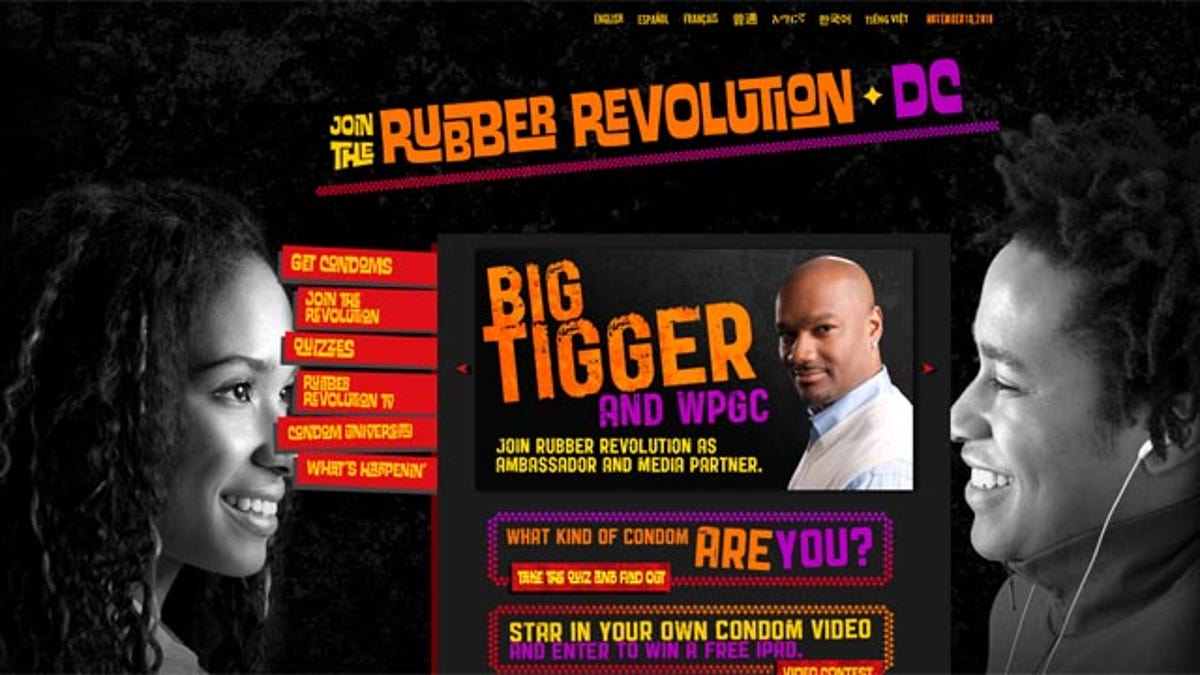
The "Rubber Revolution" campaign, which was launched earlier this month by the District of Columbia Department of Health, will target all D.C. residents for the next year and features a five-question condom quiz. (RubberRevolutionDC.com)
What kind of condom are you? The Washington, D.C., Department of Health wants you to know. And not everyone thinks it's a question the city should be asking.
An online campaign to distribute condoms by the capital city's health department "minimizes the real risk of casual sex" and sends a message that promiscuity is OK as long as you're protected, the executive director of the National Abstinence Education Association told FoxNews.com.
NAEA's Valerie Huber said the $200,000 "Rubber Revolution" campaign -- which includes a fun "pop quiz" that asks "What kind of condom are you?" -- sends a "not-too-subtle" message that could be misinterpreted by some viewers, particularly youngsters.
"It definitely minimizes any risks associated with casual sex and it sends the message that having sex with any number of partners at any time is OK as long as you use a condom," Huber told FoxNews.com on Thursday. "It's a not-too-subtle message."
Huber said she found "nothing that informs" during a brief review of RubberRevolutionDC.com, which features a guide on how to properly wear condoms and a five-question quiz that lets users determine what kind of condom suits their personality.
"It's not responsible public health," Huber said. "It's just, 'Sex is fun and let's make a game out of it.' There's a much better way to use $200,000, particularly in an area of high need and high risk."
Huber said she found the campaign particularly troubling since the District of Columbia denied federal funding for abstinence education earlier this year.
But Michael Kharfen, the Health Department's community outreach bureau chief, defended the website and its pop quiz as a way to "engage people in a different way" when it comes to condom usage.
"We've looked at ways people have done strategies to engage people in an affirming way," Kharfen said. "Some of what we've seen in research is that condoms can be stigmatizing. We're trying to change the conversation."
The campaign, which was launched this month, will target all residents of the nation's capital for the next year, Kharfen said. It was not immediately clear how many condoms have been handed out since the "Rubber Revolution" started, but the department has given away more than 3.5 million free condoms in the past year alone.
"We're expecting that this campaign is going to make that increase dramatically," Kharfen said.
The Durex brand condoms are offered in regular, large and extra large, as "one size does not fit all," the spokesman said. (Another brand, Trojan Magnums, is also offered in a separate free condom promotion.)
The website also provides visitors with four ways to obtain free condoms, including by mail and by phone, and it has the controversial five-question quiz, which is a humorous personality profile that helps you determine what kind of condom would work best for you.
For example, if you prefer cheeseburgers to a salad, club soda to champagne, work a 9-to-5 day and enjoy network comedies and reggae, you're a standard latex condom.
"Your no-frills personality is suited for the standard latex condom," the site reads. "While you enjoy a good time, you’re pretty laid-back, practical and unimpressed by excess. You have a great appreciation for the classic condom."
Once you've found out your condom type, the website helps you post your results on Facebook, Twitter, MySpace or a personal blog.
Asked if the campaign promotes promiscuity, Kharfen said: "Research that has been done about condom-promoting programs have not shown increases in sexual activity, but rather increases condom use. The reality that we're challenged with is that when you're talking about young people and adults, we have some severe epidemics on our hands."
Washington has the highest rate -- 3 percent -- of people living with HIV/AIDS in the nation, Kharfen said. Nationwide, that figure is 0.45 percent, according to the Centers for Disease Control and Prevention (CDC).
The birth rate for girls between 15 and 19 in the U.S. was 41.5 births per 1,000 in 2008; the birth rate for girls in Washington that year was 50.9 births per 1,000.
"We're not recruiting people into sexual activity," Kharfen said. "What we’re saying is if you're engaging in sexual activity, a condom is the only device that protects you from these diseases and unwanted pregnancy."












































